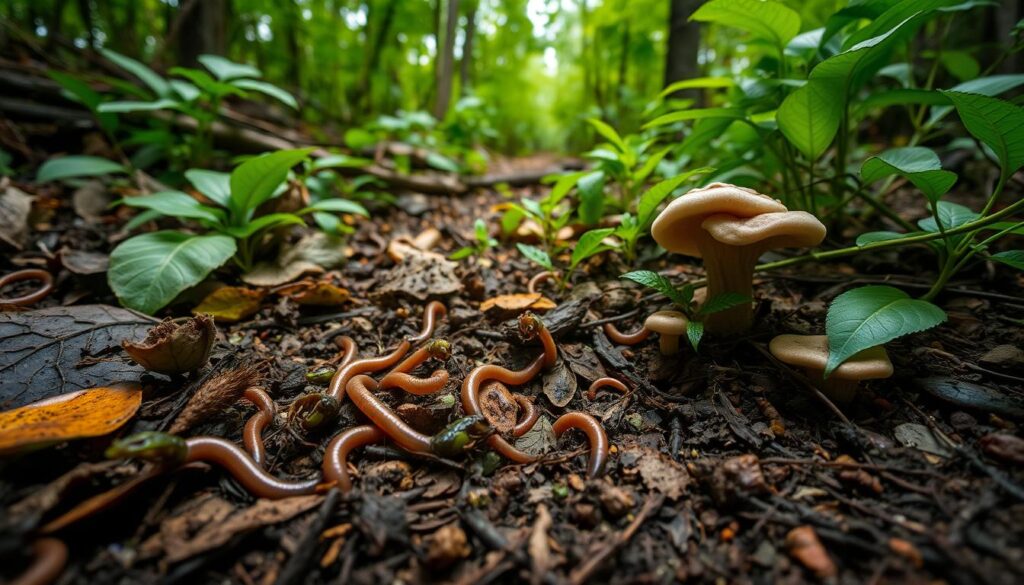
A vibrant forest floor teeming with detritivores, including earthworms, beetles, and fungi, breaking down leaves and organic matter, surrounded by lush green plants and intricate soil textures, light filtering through the canopy above, creating a rich ecosystem scene.
Detritivores, also known as detritus feeders or saprophages, get most of their nutrients from decomposing organic matter. These unsung heroes are key to the health of ecosystems. They break down decaying plant and animal matter, recycling nutrients back into the environment.
Key Takeaways
- Detritivores are organisms that feed on decomposing organic matter, known as detritus.
- They play a vital role in the food chain and ecosystem by recycling nutrients back into the environment.
- Detritivores can be found in both terrestrial and aquatic ecosystems, and include a diverse range of species.
- The decomposition process facilitated by detritivores is essential for maintaining a healthy and balanced ecosystem.
- Understanding the importance of detritivores is crucial for effective conservation and environmental management efforts.
Understanding the Detritivore’s Role
Detritivores, or detritus feeders, are key to our ecosystem. They include insects, worms, fungi, and bacteria. These organisms break down dead plants and animals, called detritus.
What are Detritivores?
Detritivores are vital in the food chain. They break down organic matter and recycle nutrients. They eat everything from leaves to animal waste.
By doing this, they turn complex materials into simpler nutrients. These nutrients are then used by other living things in the ecosystem.
The Importance of Detritivores in Ecosystems
Detritivores are crucial for nutrient cycling. This process keeps ecosystems healthy and balanced. They break down organic matter, releasing nutrients for plants to grow.
This helps keep the soil fertile. It ensures nutrients keep cycling in the ecosystem.
Detritivores also feed many other animals. They help decompose and recycle organic matter. This supports the diverse life in ecosystems.
| Detritivore Type | Examples | Ecosystem Role |
|---|---|---|
| Terrestrial Detritivores | Earthworms, termites, millipedes, springtails, fungi | Break down organic matter in soil, improve soil fertility |
| Aquatic Detritivores | Caddisfly larvae, freshwater shrimp, aquatic snails, certain bacteria | Decompose organic matter in water bodies, support aquatic food webs |
Understanding detritivores’ role shows their importance. We must keep their populations healthy and diverse.
Detrivore: Unlocking the Secrets of Nature’s Recyclers

A vibrant forest floor teeming with life, showcasing various detritivores like earthworms, woodlice, and beetles among decaying leaves and organic matter, sunlight filtering through the canopy above, rich colors and textures emphasizing the recycling process of nature.
Detritivores are the unsung heroes of our ecosystem. They break down organic matter, releasing nutrients into the soil and water. This makes these nutrients available for other organisms in the food chain. Their work is key to the health and productivity of any ecosystem.
Detritivores, also known as detritus feeders or saprophages, get most of their nutrients from decaying organic matter. By breaking it down, they make a treasure trove of nutrients available to plants and other organisms. This is the heart of a thriving ecosystem.
From earthworms to mushrooms, detritivores are diverse and vital. Their work supports the food chain and is crucial for decomposition and recycling of organic matter. Appreciating these unsung heroes helps us understand the natural world better.
| Detritivore Species | Habitat | Role in Ecosystem |
|---|---|---|
| Earthworms | Soil | Break down organic matter, aerate soil, and improve nutrient cycling |
| Millipedes | Soil, leaf litter | Shred and decompose dead plant material, releasing nutrients |
| Fungi | Soil, decaying matter | Decompose complex organic compounds, making nutrients available for other organisms |
| Caddisflies | Aquatic environments | Break down and consume decaying plant and animal matter in water |
Understanding nature’s recyclers helps us see the complex ecosystem that supports our world. Thanks to detritivores, the decomposition and nutrient cycling that underpin a healthy food chain keep going. This ensures our planet’s long-term sustainability.
Diverse Species of Detritivores

A vibrant forest floor teeming with diverse detritivores, including earthworms, beetles, and springtails, surrounded by decomposing leaves, mushrooms, and rich soil, with dappled sunlight filtering through the canopy above, showcasing the intricate ecosystem of nature’s recyclers.
Detritivores, or detritus feeders, are key players in breaking down organic matter. They live in many places, both on land and in water. Their work is vital for our ecosystems.
Terrestrial Detritivores
On land, we find many detritivores. Insects like beetles and flies are well-known for eating decaying matter. They help release nutrients back into the soil.
Earthworms and millipedes also play a big role. They eat leaf litter and other organic stuff. This helps aerate the soil.
Aquatic Detritivores
In water, detritivores are just as important. Shrimp, crabs, and some fish and invertebrates are key players. They break down dead plants and animals.
This keeps the water clean and supports the ecosystem’s health. Aquatic detritivores are crucial for a balanced environment.
Detritivores are the unsung heroes of our world. They work hard to break down organic matter and recycle nutrients. Without them, our ecosystems would suffer greatly.
The Decomposition Process
Detritivores are key in breaking down dead plants and animals. This process, called decomposition, is vital for nutrient cycling. They release nutrients like nitrogen, phosphorus, and potassium back into the soil and water. This makes these nutrients available for other living things.
Breaking Down Organic Matter
Earthworms, termites, and certain bacteria and fungi are the heroes of decomposition. They have special digestive systems to break down tough organic compounds. This includes cellulose, lignin, and chitin, into simpler forms that plants and other organisms can use.
The decomposition process takes time, with detritivores playing a crucial role at every stage. They physically break down the organic matter, increasing its surface area. They also release enzymes to further break it down, making it easier for other microorganisms to recycle the nutrients.
Many factors affect how fast decomposition happens. Temperature, moisture, and the type of organic matter are important. Generally, warmer and wetter places have faster decomposition because detritivores and microorganisms work better in these conditions.
“Detritivores are the unsung heroes of the natural world, quietly working to recycle nutrients and maintain the delicate balance of our ecosystems.”
Understanding detritivores’ role in decomposition helps us see the importance of life’s web. The recycling of organic matter and nutrients is key for our soils, forests, and water habitats to stay healthy and productive.
| Detritivore Type | Examples | Primary Decomposition Role |
|---|---|---|
| Terrestrial Detritivores | Earthworms, Termites, Millipedes, Isopods | Physical fragmentation of organic matter, release of enzymes, and mixing of soil layers |
| Aquatic Detritivores | Caddisfly larvae, Freshwater shrimp, Snails | Breakdown of submerged plant materials and detritus in water bodies |
Detritivores and Nutrient Cycling
Detritivores, also known as detritus feeders or saprophages, are key in nutrient cycling. They get most of their nutrients from decomposing organic matter. This process breaks down organic material, making nutrients available for plants.
Plants then use these nutrients to grow strong. They become food for other animals, keeping the ecosystem balanced. This balance is crucial for the health and productivity of the ecosystem.
| Nutrient Cycling Process | Importance of Detritivores |
|---|---|
| Decomposition of organic matter | Detritivores break down dead plants, animals, and other organic debris, releasing nutrients back into the soil or water. |
| Nutrient absorption by plants | The nutrients released by detritivores are then taken up by plants, providing them with the essential elements they need to grow and thrive. |
| Sustaining the food chain | As plants flourish, they become food sources for herbivores, which in turn feed other organisms, creating a balanced and productive ecosystem. |
Detritivores are vital for nutrient cycling. Without them, ecosystems would suffer. They keep the balance necessary for life on Earth.
“Detritivores are the unsung heroes of the natural world, quietly but tirelessly working to recycle the essential nutrients that sustain life on our planet.”
Threats to Detritivore Populations
Detritivores play a key role in keeping ecosystems balanced. Yet, they face many environmental challenges. Habitat loss is a big problem, as cities and factories spread into their homes.
Environmental Challenges
Pollution is another big threat. It can be from chemicals or plastic. This pollution makes it hard for detritivores to break down organic matter. This is bad for the nutrient cycle and ecosystem health.
Conservation Efforts
We need to protect detritivores. Conservation is key. We must save their habitats, manage waste better, and teach people about their role in nature.
Important Point
| NO. | Important Points |
| 1. | About Us |
| 2. | Contact Us |
| 3. | Disclaimer |
| 4. | Privacy Policy |
FAQs of Detrivore
What are detritivores?
Detritivores, also known as detritus feeders or saprophages, are organisms that get most of their nutrients from decomposing organic matter in an ecosystem.
What is the importance of detritivores in ecosystems?
Detritivores are key to the food chain and ecosystem health. They break down organic matter, releasing nutrients back into the soil and water. This makes these nutrients available to other organisms in the ecosystem.
What are the different types of detritivores?
Detritivores exist in various habitats, both on land and in water. On land, they include insects like beetles and flies, as well as earthworms and millipedes. In water, they include shrimp, crabs, and certain fish and invertebrates.
How do detritivores contribute to the decomposition process?
Detritivores are crucial in decomposing dead and decaying matter. This process releases nutrients back into the soil and water. These nutrients are then available to other organisms in the ecosystem.
What is the role of detritivores in nutrient cycling?
Detritivores are vital for nutrient cycling in ecosystems. They break down organic matter, releasing nutrients that plants can absorb. Plants then provide food for other organisms in the food chain. This cycle is essential for ecosystem health and productivity.
What are the threats to detritivore populations?
Detritivore populations face threats like habitat loss, pollution, and climate change. To protect these vital “recyclers,” we need to conserve natural habitats and address these threats.
See these too
- Read Also: Detritus: Nature’s Recycling System Explained
- Read Also: Desiccation: Understanding the Drying Process

Pingback: Understanding Common Diseases and Their Impact 1